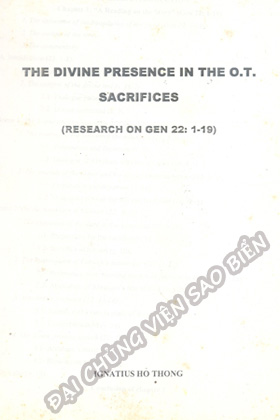| GENERAL INTRODUCTION |
|
|
|
4 |
| Chapter 1: "A Reading on the Story" (Gen 22: 1-19) |
|
|
|
16 |
| 1. The definition of the boundaries of the story (Gen 22: 1-19) |
|
|
|
16 |
| 2. The outline of the story. |
|
|
|
17 |
| 3. The commentary. |
|
|
|
20 |
| A. Introduction (22. 1-2) |
|
|
|
20 |
| 1. The context of the divine test (v. 1a) |
|
|
|
20 |
| 2. The content of the divine test (v. 1b-2) |
|
|
|
26 |
| 2.1- Dialogue patern (v. 1b) |
|
|
|
26 |
| 2.2- Divine command (v.2) |
|
|
|
27 |
| Scene 1: The journey to the mountain of Yahweh (22: 3-8) |
|
|
|
41 |
| 1. The journey to the bottom of the mountain (22: 3-5) |
|
|
|
41 |
| 1.1- Preparation and departure (v.3) |
|
|
|
41 |
| 1.2- Dialogue of Abraham with his servants (vv. 4-5) |
|
|
|
43 |
| 2. The journey of the father and his son up to the mountain (22: 6-8) |
|
|
|
49 |
| 2.1- Preparation and departure (v.6a) |
|
|
|
49 |
| 2.2- Dialogue between the son and his father (vv. 6b-8) |
|
|
|
50 |
| Scene 2: On the mountain of Yahweh (22: 9-18) |
|
|
|
56 |
| 1. The excution of the third divine command (22: 9-18) |
|
|
|
56 |
| 1.1- Preparation of sacrifice (v. 9) |
|
|
|
56 |
| 1.2- Sacrifice of his son (v. 10) |
|
|
|
58 |
| 2. The interruption of Yahweh's messenger (22: 11-12) |
|
|
|
58 |
| 2.1- Prohibition from harming the son of promise in any way (v. 12a) |
|
|
|
61 |
| 2.2- Attestation of Abraham's fear of God (v. 12b) |
|
|
|
63 |
| 3. Abraham's response (22: 13-14) |
|
|
|
65 |
| 3.1-Sacrifice of a ram in place of Isaac (v. 13) |
|
|
|
65 |
| 3.2- Commemoration (v. 14) |
|
|
|
68 |
| 4. The divine promise speech (22: 15-18) |
|
|
|
70 |
| 4.1- Abraham's merit |
|
|
|
70 |
| 4.2- Blessing on his offspring |
|
|
|
71 |
| B. Epilogue (v. 19) |
|
|
|
72 |
| Chapter 2: "The Change of the Divine Names and the Promise Speech" |
|
|
|
84 |
| I. The change of the divine names |
|
|
|
91 |
| 1. The change of the divine names in the context of the present story. |
|
|
|
91 |
| 2. The OT conception of the divine name. |
|
|
|
94 |
| 2.1- Personal divine name, Yahweh. |
|
|
|
94 |
| 2.2- Generic term for God, Elohim. |
|
|
|
95 |
| Conclusion of the change of the divine names in the story |
|
|
|
124 |
| II. The divine promise. |
|
|
|
129 |
| 1. The promise is the divine initiative to build the relationship with Abraham |
|
|
|
131 |
| 1.1- Divine promise as the divine program (Gen 11: 27 - 12: 9) |
|
|
|
131 |
| 1.2- Development of the promise of son(13: 14-18) |
|
|
|
135 |
| 2. The divine promise in crisis. |
|
|
|
136 |
| 2.1- Abraham in the crisis of the promise (Gen 15) |
|
|
|
136 |
| 2.2- Sarah in the crisis of the promise (Gen 16) |
|
|
|
139 |
| 3. The rebuilding of the faith in the promise. |
|
|
|
142 |
| 3.1- Theophany to Abraham (Gen 17) |
|
|
|
142 |
| 3.2- Divine visit to Sarah (Gen 18) |
|
|
|
146 |
| 4. The reception of the son of promise, the way of the detachment. |
|
|
|
147 |
| 4.1- Birth of the son of promise (21: 1-7) |
|
|
|
147 |
| 4.2- Choice of the son of promise (21: 8-21) |
|
|
|
148 |
| 4.3- Choice of the Giver and Makerson of promises (22: 1-19) |
|
|
|
151 |
| Conclusion of the divine promise speech |
|
|
|
|
| Chapter 3: "The Presence of God in the Sacrificial Liturgy" |
|
|
|
159 |
| I. Introduction |
|
|
|
159 |
| 1. The liturgical and sacrificial background of Gen 22: 1-19 |
|
|
|
160 |
| 2. The theories of the OT sacrificies. |
|
|
|
163 |
| II. The history of the OT sacrificie. |
|
|
|
165 |
| 1. The pre-exilic period of the OT sacrificie |
|
|
|
166 |
| 1.1- The place of sacrifice. |
|
|
|
166 |
| 1.2- The occasions of sacrifice. |
|
|
|
167 |
| 1.3- The forms of sacrifice. |
|
|
|
168 |
| 1.4- The sacrifice materials. |
|
|
|
171 |
| 1.5- The rituals of sacrifice. |
|
|
|
172 |
| 2. The development of the post-exilic system of sacrifices. |
|
|
|
172 |
| 3. The prophetic polemic against the sacrificial deviations. |
|
|
|
174 |
| III. The OT conception of sacrifice. |
|
|
|
176 |
| 1. The slaughter of a sacrificial victim is not the central place of sacrifices. |
|
|
|
177 |
| 2. The substitution of a victim for the worshiper is not the centre of sacrifice. |
|
|
|
178 |
| 3. The OT sacrifice is fundamentally conceived as a meal offered to God. |
|
|
|
179 |
| 3.1- The sacrificial materials are the food. |
|
|
|
179 |
| 3.2- The sacrificial materials are prepared as a meal. |
|
|
|
179 |
| 3.3- The law of sacrifice materials is the law of hospitality. |
|
|
|
180 |
| 3.4- The theology of the OT sacrifice as a meal offered to God. |
|
|
|
183 |
| IV. The function of the OT sacrifice. |
|
|
|
185 |
| 1. The altar is the epitome of the theophany on Mount Sinai. |
|
|
|
187 |
| 2. Three principal teachings of the law of the altar. |
|
|
|
188 |
| 2.1- Yahweh comes where Israel offers a sacrifice on the altar. |
|
|
|
188 |
| 2.2- Yahweh comes to receive the hospitality of his people. |
|
|
|
189 |
| 2.3- At the moment of the sacrifice, God comes to bless his people. |
|
|
|
190 |
| Conclusion of chapter 3 |
|
|
|
192 |








